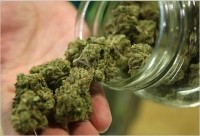Drugs
Our Services
- Request Presentation - our office provides several presentations on drugs and drug use
- RA Resources - Bulletin boards and posters available to RAs in our office.

A drug is a chemical substance with the potential to alter the structure and function of a living organism.
Common Types of Drugs
Cannabinoids: causes slow thinking and reaction time, impaired balance, impaired memory and learning, and increased heart rate
- Marijuana, Hashish
Depressants: causes reduced anxiety, lowered inhibitions, slowed pulse and breathing, fatigue, loss in memory, and impaired coordination
- Alcohol, Valium, Xanax, Barbiturates, GHB, Methanqualone
Hallucinogens: causes altered states of perception and feeling, decreased ability to move, memory loss, flashbacks
- LSD (acid), Mescaline, Psilocybin
Opioids: causes drowsiness, nausea, pain relief, confusion, sedation, unconsciousness, coma
- Codeine, Heroin, Morphine, Opium
Stimulants: causes increased heart rate and blood pressure, feelings of exhilaration, increased alertness, weight loss, heart failure
- Cocaine, Methamphetamine, Nicotine, Ritalin, Adderall
Prescription Drug Abuse
Prescription and over-the-counter drugs are falsely believed to be safer than illicit drugs. Misuse of these medications can cause serious health effects, addiction and death. Many people benefit from these drugs when used properly, but when abused they can become very addictive and dangerous.
Types of prescription drugs that are abused:
- Opioids prescribed for pain relief
- CNS depressants prescribed for anxiety or sleep problems
- Stimulants prescribed for ADHD, sleep disorder narcolepsy, or obesity
The misuse of prescription drugs is a growing trend on most college campuses. 18.8% of UC students reported using prescription drugs not prescribed to them and the prescription medications abused most by UC students are stimulants and pain killers.